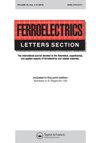Study of the Lattice Thermal Conductivity of Janus In 2 Ge 2 S 6 and In 2 Ge 2 S 3 Se 3 Bilayers
IF 1.2
4区 物理与天体物理
Q4 PHYSICS, CONDENSED MATTER
引用次数: 0
Abstract
AbstractIn this paper, we investigate the lattice thermal conductivity of Janus In2Ge2S6 and In2Ge2S3Se3 bilayers by solving the phonon Boltzmann transport equation using first-principles calculations. We found that this is mainly due to the fact that the frequencies at which larger gaps appear in the intermediate and high frequency optical branches of In2Ge2S3Se3 are smaller than those of In2Ge2S6, which shifts the phonon dispersion curve of In2Ge2S3Se3 downward, which makes the overall phonon group velocity of In2Ge2S3Se3 material smaller than that of In2Ge2Se6 material, and also due to the fact that In2Ge2S3Se3 soft bending in the finite layer thickness coupling and the tight connection of the in-plane acoustic modes, resulting in increased phonon-phonon scattering processes, shorter phonon relaxation times, and larger Grüneisen parameters indicating a stronger anharmonic In2Ge2S3Se3 structure, all these factors combined lead to a lattice thermal conductivity of In2Ge2S3Se3 smaller than the lattice thermal conductivity of In2Ge2S6. At a temperature of 1000 K, the In2Ge2S3Se3 structure has a minimum lattice thermal conductivity of about 0.22 W/mK, and In2Ge2S6 has a minimum lattice thermal conductivity of about 0.4 W/mK. Our results suggest that Janus In2Ge2S6 and In2Ge2S3Se3 bilayers are potential for future thermal management of nanoelectronic devices and thermoelectric devices. two-dimensional materials.Keywords: Two-dimensional materialsFirst-principles calculationsLattice thermal conductivity Disclosure StatementNo potential conflict of interest was reported by the author(s).Janus in2ge2s6和in2ge2s3s3双分子层晶格导热性的研究
摘要本文利用第一性原理计算方法求解声子玻尔兹曼输运方程,研究了Janus In2Ge2S6和In2Ge2S3Se3双分子层的晶格热导率。我们发现这主要是由于In2Ge2S3Se3的中高频光学分支出现较大间隙的频率小于In2Ge2S6,这使得In2Ge2S3Se3的声子色散曲线向下移动,使得In2Ge2S3Se3材料的整体声子群速度小于In2Ge2Se6材料。由于In2Ge2S3Se3在有限层厚耦合中的软弯曲和面内声模的紧密连接,导致声子-声子散射过程增加,声子弛豫时间缩短,grisen参数增大,表明In2Ge2S3Se3的非调和结构更强,所有这些因素综合起来导致In2Ge2S3Se3的晶格导热系数小于In2Ge2S6的晶格导热系数。在1000 K温度下,In2Ge2S3Se3结构的最小晶格导热系数约为0.22 W/mK, In2Ge2S6结构的最小晶格导热系数约为0.4 W/mK。我们的研究结果表明,Janus In2Ge2S6和In2Ge2S3Se3双分子层在未来纳米电子器件和热电器件的热管理方面具有潜力。二维材料。关键词:二维材料第一性原理计算晶格热导率披露声明作者未报告潜在利益冲突。
本文章由计算机程序翻译,如有差异,请以英文原文为准。
求助全文
约1分钟内获得全文
求助全文
来源期刊

Ferroelectrics Letters Section
物理-物理:凝聚态物理
CiteScore
1.10
自引率
0.00%
发文量
1
审稿时长
4.8 months
期刊介绍:
Ferroelectrics Letters is a separately published section of the international journal Ferroelectrics. Both sections publish theoretical, experimental and applied papers on ferroelectrics and related materials, including ferroelastics, ferroelectric ferromagnetics, electrooptics, piezoelectrics, pyroelectrics, nonlinear dielectrics, polymers and liquid crystals.
Ferroelectrics Letters permits the rapid publication of important, quality, short original papers on the theory, synthesis, properties and applications of ferroelectrics and related materials.
 求助内容:
求助内容: 应助结果提醒方式:
应助结果提醒方式:


